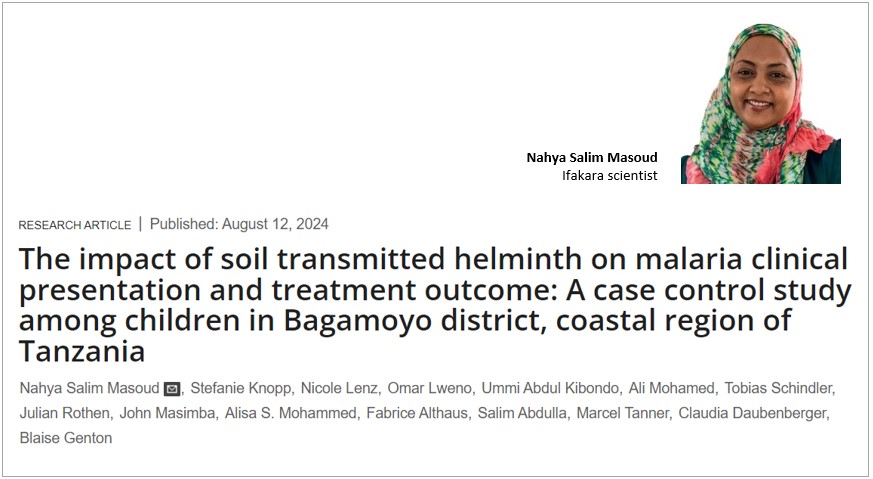
FRESH: New insights into the relationship between worm infections and malaria

A study conducted in Tanzania has provided new insights into the relationship between soil-transmitted helminths (STH) – commonly known as worm infections – and malaria severity. The research, the first of its kind, looked at how different worm types, such as pinworms, threadworms, and hookworms, impact the presentation and treatment outcomes of malaria in affected populations, revealing both positive and negative effects.
Published on the PLOS Neglected Tropical Diseases journal, the study was a collaborative effort led by researchers from Ifakara Health Institute, Swiss TPH, the University of Basel, and the University of Lausanne, with Dr. Nahya Salim Masoud of Ifakara Health Institute and Muhimbili University of Health and Allied Sciences (MUHAS) serving as the lead author.
Some worms protect against malaria, others make it worse
The study found that different worm infections have different effects on malaria. For example, pinworm was revealed to offer protection against both mild and severe forms of malaria. This is a first-time discovery, as this protective role had not been documented before for this particular species. The study suggests that this type of worm might help reduce malaria severity, possibly through its impact on gut microbiota and immune response modulation.
In contrast, the study found hookworm species were associated with an increased risk of severe malaria. This finding aligns with prior research, underscoring the harmful impact of hookworms, which are known to be invasive, blood-sucking parasites that can weaken the body’s ability to fight malaria effectively.
Implications for immune response and public health
The study provided insight into how these worms affect the immune system whereby hookworms tend to cause inflammation that can worsen malaria, while pinworm seems to reduce inflammation, possibly helping in preventing severe malaria. Additionally, the study noted the protective role of threadworms, although its effect on clinical malaria was not statistically significant.
“Immunological analysis of the same children included in this case-control study confirmed the pro-inflammatory effect of hookworm and S. stercoralis (threadworm) and the anti-inflammatory effect of E. vermicularis (pinworms). Furthermore, epigenetic analysis showed that E. vermicularis (pinworms) acts through the gut microbiota to influence the immune system.”
These findings are of great importance for public health, especially in regions where both malaria and worm infections are common. The scientists suggest that addressing both malaria and worm infections together could lead to better health outcomes in affected communities.
However, the study also raises questions about current deworming programs, particularly for pinworms. While deworming is important in reducing helminth-related diseases, the potential protective role of pinworms against malaria suggests that a more careful approach might be needed.
“Children usually suffer from higher prevalence and heavy parasitic loads of both Plasmodium and soil-transmitted helminths. Deworming programs have been advocated to prevent helminth-related morbidity. However, the question of how the two parasitic infections interact and how deworming should continue is difficult to answer due to conflicting research findings.”
Need for further research to improve health strategies
Despite the valuable findings, the study did have some limitations, such as a small number of severe malaria cases, which means more research is needed to fully understand these interactions. The scientists call for further studies in different regions and populations to confirm these findings and to guide public health strategies more effectively.
Additionally, they recommend that future health efforts should combine different approaches for managing both worms and malaria, ensuring that interventions are effective and suited to the specific needs of each community.
“Overall, these results demonstrate a protective role of E. vermicularis against clinical malaria and confirm the enhancing effect of hookworm on malaria morbidity... The present findings should foster the implementation of an integrated control program for these two common parasites coupled with screening and then treating the affected children.”
The scientists concluded by emphasizing the importance of diagnosing pinworm infections and understanding their impact across various regions including all ages and at-risk groups, which could help refine control programs.
Ifakara scientists lead the study
The study was led by Dr. Nahya Salim Masoud of Ifakara Health with affiliation to Muhimbili University of Health and Allied Sciences (MUHAS). Other key contributors from Ifakara include Omar Lweno, Ummi Abdul Kibondo, Ali Mohamed, Tobias Schindler, Julian Rothen, John Masimba, Alisa Mohammed, and Salim Abdulla.
Additional contributors include Stefanie Knopp and Marcel Tanner from Swiss TPH, Claudia Daubenberger from the University of Basel and Blaise Genton the University of Lausanne.
Read the publication here.
